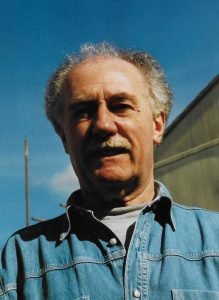I asked Vic Legg, one of the founders and still a regular singer at Bodmin Folk Club if he might like to tell me a bit about how he got interested in this whole folk thing in the first place ……… so in his own words …
I was born in 1941. Brought into the world by my Grandmother. It was a Romany household, and every-one sang. (I still have faint memories of Gran, bouncing me on her knee and singing step-dance songs.) It was a mixture of songs from many sources. Many traditional folk songs, but no differentiation was made, except that for some reason the “folk songs” were called, the OLD songs. On social occasions, in the pubs, fairs, weddings, etc., children were in attendance, from infants up to teenagers. It was all part of my upbringing.
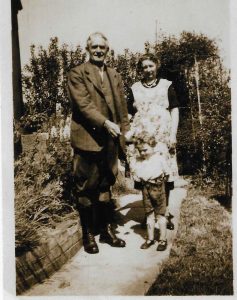 School was difficult at first. Much prejudice and name-calling. But it was sorted out in the time-honoured way… a playground fight or two, which I won, thanks to my Grand-dad’s coaching. Whilst in infant and junior school, I was fascinated by the skipping, ball games, and other playground games that were played by the girls, and had an accompanying song to keep the game moving along. These songs, I felt, were part of my understanding of progression. The next move on from Gran’s dawdling.
School was difficult at first. Much prejudice and name-calling. But it was sorted out in the time-honoured way… a playground fight or two, which I won, thanks to my Grand-dad’s coaching. Whilst in infant and junior school, I was fascinated by the skipping, ball games, and other playground games that were played by the girls, and had an accompanying song to keep the game moving along. These songs, I felt, were part of my understanding of progression. The next move on from Gran’s dawdling.
I didn’t get selected for Grammar School, so I stayed at the same school for eleven years. There was no meaningful work around Bodmin, so at fifteen I sat the Dockyard Entrance Exam to become an apprentice. I passed. (2nd out of 250.) It meant moving away and going into lodgings for five years. It was a life changer. Here was I, a young country boy, moving, with no knowledge of what to expect, into the big city. I was working in an establishment that had four times the population of the town I had moved from! My first lodgings were in the red-light district of Plymouth, in theatrical digs. The digs were awful, but I stuck it out for thirteen months. 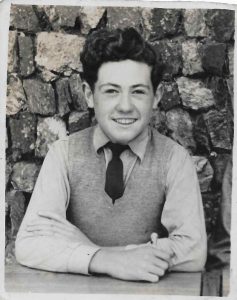 The bright side, however, was that whilst I was there, Tessie O’Shea and Fred Ems stayed. But the real highlight was Lonnie Donegan and his Skiffle Group, of whom, at the time, I was a massive fan! Many a person learned his songs, including myself, which in turn, led to a better knowledge of folk song. Also, in the dockyard canteens, off-duty sailors would get around the canteen piano at lunch-times and sing their sailors ditties, which I absolutely loved. Many of their songs were rude, coarse and misogynistic, but were part of my folk education. Songs of the people, sung by the people themselves and gave me encouragement to seek for more.
The bright side, however, was that whilst I was there, Tessie O’Shea and Fred Ems stayed. But the real highlight was Lonnie Donegan and his Skiffle Group, of whom, at the time, I was a massive fan! Many a person learned his songs, including myself, which in turn, led to a better knowledge of folk song. Also, in the dockyard canteens, off-duty sailors would get around the canteen piano at lunch-times and sing their sailors ditties, which I absolutely loved. Many of their songs were rude, coarse and misogynistic, but were part of my folk education. Songs of the people, sung by the people themselves and gave me encouragement to seek for more.
Towards the end of my apprenticeship, Cyril Tawney was running a folk club in Plymouth. This was quite a new phenomenon, as very few were around at that time. I went along a couple of times and enjoyed the atmosphere. Cyril’s club was good, and gave me a taste for more of the same.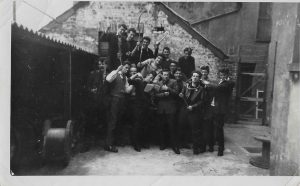
In 1962 I left the dockyard and got a job in a new factory in Bodmin as an engineering machinist. The folk club movement was starting to take off, boosted by hour long radio programmes combining folk, jazz and country music. This sort of music was at the forefront of people’s minds and gave the movement a big leg-up.
Many folk clubs would pop up during the summertime in Cornwall, mainly of the contemporary sort. As soon as the season was over they would disappear. We called them “mushroom clubs”! There were a few solid clubs in the county, and one in particular was the Folk Cottage at Mitchell. It had a formidable line-up of residents. Wizz Jones and Pete. Stanley, Ralph McTell, Brenda Wootton, The Humblebums, and the Famous Jug Band, to name a few. Very modern in style and very entertaining, but I was seeking something different which I just couldn’t lay my finger on.
Then, one evening, a singer called Alan Robinson got up from the audience and sang three traditional songs. This was my stuff; this is what I was searching for!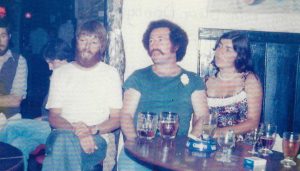
In Bodmin around this time, 1967ish, there was a sing-song in one of the pubs, mainly supported by a more “traditional” element. We decided to start a folk club along more traditional lines. The club’s aim was to support and promote traditional singers, musicians, etc., and encourage our club performers to learn and perform material of a traditional nature. There was a mass of L.P.’s being produced of shanty’s, rebel songs, etc., and song books which people could build a song list from. We had a bit of money from door charges to hire professionals, “revival” singers we called them, who sang and played the sort of material that our membership enjoyed. I went away to Leicester to work for a short while at the very start of the folk club, and when I returned the club was established and in full swing. I was a very reluctant singer at first, preferring to be an m/c. This was shyness on my part and lack of confidence. But I learned a few songs and soon my confidence grew and it wasn’t long before I became very much involved in the Bodmin Folk Club In 1970, my good friend Steve Danby and myself went up to Exeter. We had been told by Steve’s sister that there was an event 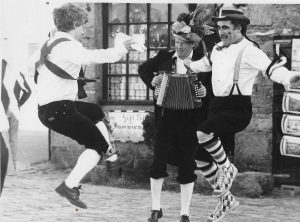 called a “Morris Ring Meeting” taking place, and on the Sunday would be a big display. We had no idea what it was all about, but decided to go and have a look. It was tremendous. So colourful and energetic, with such lively tunes played on a variety of instruments. We were really taken with Morris dancing, and decided to try and form a team in Bodmin. Several people were interested from the folk club and nearby dance clubs. So, we found an instructor willing to take on a bunch of enthusiasts, and with a little financial help from the folk club, made a start. It wasn’t long before it was up and running, and standing on its own feet. This was the formation of Trigg, and I became a Morris dancer!
called a “Morris Ring Meeting” taking place, and on the Sunday would be a big display. We had no idea what it was all about, but decided to go and have a look. It was tremendous. So colourful and energetic, with such lively tunes played on a variety of instruments. We were really taken with Morris dancing, and decided to try and form a team in Bodmin. Several people were interested from the folk club and nearby dance clubs. So, we found an instructor willing to take on a bunch of enthusiasts, and with a little financial help from the folk club, made a start. It wasn’t long before it was up and running, and standing on its own feet. This was the formation of Trigg, and I became a Morris dancer!
Around this time, one of our folk club members, who came from Southern Ireland, told us about the music of his village, Knocknagree. Steve. and I went over, and were astounded by the music, and the dancing. The main musicians were Dennis (the Weaver) Murphy, and Johnny O’Leary. Now, both legends in Irish social dance music. The tunes were unique to the area, and also, the dances. The famous “Kerry Sets”. Dan. O’Connell’s East End Bar literally bounced to the music on Friday and Sunday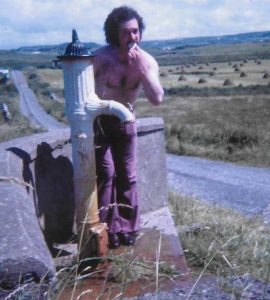
Evenings. We decided to go back again the following year, but this time we extended our visit and went up to Co. Clare. To Doolin, and the Russell brothers. Once again, magnificent music, and the added experience of witnessing the mid-summer bonfires, all alight on the high peaks of Clare. I went again, this time with Trigg. (Steve had gone away to teacher training). We covered similar ground, but the over-riding experience of this visit was one evening, ending up in Milltown Malbay. By pure chance we met Willy Clancy. We introduced ourselves, and he invited us into his house whilst he got ready to go out. He picked up his pipes and off we went to his local bar for an evening of music, stories, song and morris dancing. It was just sensational, and one of the most memorable evenings of my life.
When all this was happening, I had a nagging feeling in the back of my mind about the songs of my family. I thought, incorrectly, that our songs were of no significance, as they didn’t match any written text which I thought to be the definitive and proper version. But they were, in several cases complete songs, as against the fragments that I’d heard on record, and my family were equally as good singers as those who had been recorded. I spoke to Peter Bellamy about it, and he asked me to make a short recording of my Aunt Charlotte for him. He was convinced by her singing that the material was valid and worth recording, knowing that there was more where this came from. He contacted Bill. Leader, who agreed to record my Gran and Grand-dad, aunts Betsy and Charlotte, and my mother, Sophie. Time went by, and no word from Bill Leader. I contacted Peter again and he said that he would come down and record them when he had some time. In the interim, sadly Gran and Grand-dad died. and were never recorded. A shame, because Gran had a wealth of songs, and a voice from another, much earlier era, which would have made the recording quite unique. Just when Peter was ready to record my aunts mum, he discovered Walter Pardon, which took all his time and energy. So he never got around to recording them. (In the middle of all this, Peter was working on his epic ballad opera, “The Transports”, upon which I was invited to sing. In 1976 it made Melody Makers Folk Album of the Year. We performed it live at a couple of festivals, and also on Radio Belgium. It was my first ever visit to ma land Europe!) Eventually, Pete Coe did the job, and very successfully. Sometime later the tapes ended up with John Howson of Veteran Music,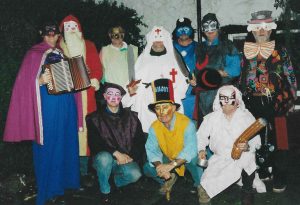 who produced a wonderful C.D. called “Catch Me If You Can”, with very complimentary sleeve notes and some great photo’s. I was asked to make a C.D. also, of my songs. just to fill in a few gaps and add a bit to the family collection. This resulted in me being invited to sing at many clubs, festivals and gatherings up and down the country over the ensuing years, and a few trips overseas, also. I have wonderful memories of performing at Pinewoods Festival in 1996.
who produced a wonderful C.D. called “Catch Me If You Can”, with very complimentary sleeve notes and some great photo’s. I was asked to make a C.D. also, of my songs. just to fill in a few gaps and add a bit to the family collection. This resulted in me being invited to sing at many clubs, festivals and gatherings up and down the country over the ensuing years, and a few trips overseas, also. I have wonderful memories of performing at Pinewoods Festival in 1996.
My father came from Gloucestershire, from the village of South Cerney. He, and his father were characters in the village Mummers play. (Dad called it “Mummering”.) Grampy was the musician, he played a Clarks whistle, and dad, just a boy, played the character, “Bighead”.
Trigg perform a mummers play at Christmas time which includes characters from several other different plays. Incorporated into the Trigg play is a character from the South Cerney play. That of “Farmer Fat”. The South Cerney play has long since ceased, but it gives me a warm feeling to know that one of it’s characters has survived elsewhere, and is still “treading the boards”.
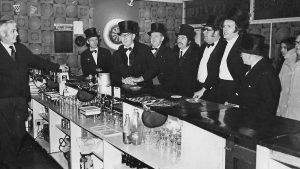
In the latter days of my schooling I was an errand boy for the International Stores. I delivered boxes of groceries on a bike with a bosket over the front wheel. One evening in mid-winter whilst out working I saw some men in top hats and tails walking through the town. I told my best friend at school the next day what I had seen, and he said, “They’re Wassailers. My father’s one. They go out once a year and get drunk!” I remembered this, and several years later, in the early days of the folk club, and was getting interested in old customs, I decided to hunt these characters down. I found out when and where they would be, and Lar Cann and myself waited for them to arrive in one of the local pubs. At about 10pm., five top hatted men came into the bar, a little bit worse for the beer, and sang a wonderful wassail song that I’d never heard before!
After a drink and some cash, and a bit of banter, it was time for them to leave. Just before they left they sang another wonderful wassail song that I’d never heard before. What a discovery! Before they left, we managed to have a quick chat with them and told them that we were extremely interested in their custom. The upshot was that we could go around with them the following year as “Coat Boys”. This meant doing the visiting, but waiting outside the houses they were invited into, until they came outs holding their wet coats. (It’s part of the custom, and it acts as a “filter system”. To see if we met with their approval before becoming a member.) We passed, and joined up the next year in full regalia. It was only then, by 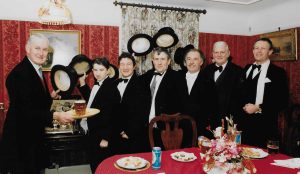 delving into history, that we found that Bodmin Wassailers had been playing out their custom for nearly 400 years, and was the only wassail with a continuous history in the nation, still performing a house visiting type of wassail. We didn’t wassail apple trees, that’s different custom and on a different day. The Bodmin wassailers became known, and were invited to several festivals and events both near and far. Including a showing at Cecil Sharp House and the Commonwealth Institute. The custom still goes strong, and the †own council have adopted us and make us part of their annual celebrations. Several of the old wassailers that were with us in the early days of my wassailing are now with the big Wassailer in the sky. I would like to think they are looking down and saying, “well done, lads”.
delving into history, that we found that Bodmin Wassailers had been playing out their custom for nearly 400 years, and was the only wassail with a continuous history in the nation, still performing a house visiting type of wassail. We didn’t wassail apple trees, that’s different custom and on a different day. The Bodmin wassailers became known, and were invited to several festivals and events both near and far. Including a showing at Cecil Sharp House and the Commonwealth Institute. The custom still goes strong, and the †own council have adopted us and make us part of their annual celebrations. Several of the old wassailers that were with us in the early days of my wassailing are now with the big Wassailer in the sky. I would like to think they are looking down and saying, “well done, lads”.
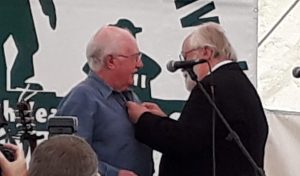 A few years ago I was awarded the E.F.D.S.S. gold badge. A modest little item with a big meaning. When I saw the list of previous recipients, I was left in quite a quandary. I just couldn’t see how my contribution to folk, (which basically was having a good time!) sat alongside the contributions of Ralph Vaughan Williams, Maud Carpeles, and people of this stature. I pondered, hard and long, and eventually decided to accept, for this reason. Those lovely people who sit and listen to songs, have a bit of a dance, follow an ‘Obby ‘Oss or such thing, the publican who gives the use of a room or forecourt, etc., the list is long, don’t get gold badges. I thought this to be a bit unfair. Where would any of the folk events be, or indeed “folk” be, without these wonderful people* It would be over, game, set and match. So when my good friend Eddie Upton presented me with the gold badge at the Dartmoor festival, I gratefully accepted, but shared my badge with all those people out there that make the whole thing tick. I proudly wear it, but I wear it with them in mind. It helps me feel more at ease.
A few years ago I was awarded the E.F.D.S.S. gold badge. A modest little item with a big meaning. When I saw the list of previous recipients, I was left in quite a quandary. I just couldn’t see how my contribution to folk, (which basically was having a good time!) sat alongside the contributions of Ralph Vaughan Williams, Maud Carpeles, and people of this stature. I pondered, hard and long, and eventually decided to accept, for this reason. Those lovely people who sit and listen to songs, have a bit of a dance, follow an ‘Obby ‘Oss or such thing, the publican who gives the use of a room or forecourt, etc., the list is long, don’t get gold badges. I thought this to be a bit unfair. Where would any of the folk events be, or indeed “folk” be, without these wonderful people* It would be over, game, set and match. So when my good friend Eddie Upton presented me with the gold badge at the Dartmoor festival, I gratefully accepted, but shared my badge with all those people out there that make the whole thing tick. I proudly wear it, but I wear it with them in mind. It helps me feel more at ease.
In later years I have been fortunate enough to visit many overseas nations. From the U.S.A. in the west, to Cyprus in the east. In nearly all of them I have encountered folk music, dance or song which has been not just an eye-opener, but a delight to witness. Traditional performance has always been what I’ve enjoyed most, and it’s been out there in droves.
Some of my fondest memories are of travelling in eastern Europe. Hungary, and it’s dulcimer- like instruments. Bulgaria’s singers who can sing two different notes at once. The dancers, singers and musicians of N.E. Romania. The “Partisan” songsters and men dancing together to strange rhythms in Albania, and †he lone bag-piper in Tirana’s main square who looked like he was wrestling with a dead goat! Not to exclude the many Roma bands I came across. And that’s just scratching the surface.
I don’† dance any more because of a duff knee , but† I still m/c for Trigg. And although my hearing is now badly affected, I still enjoy singing a song or two, Along with like-minded people. It’s been a great musical life, who am I to complain!